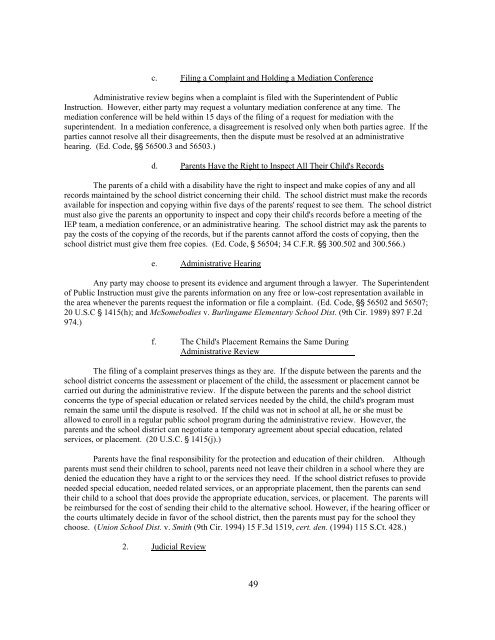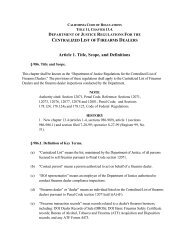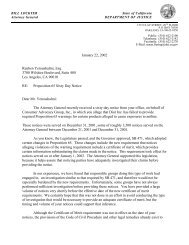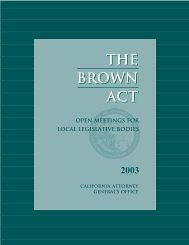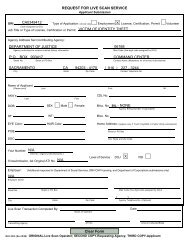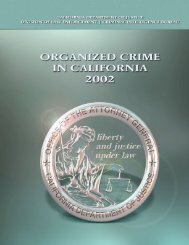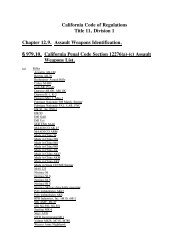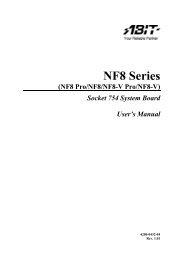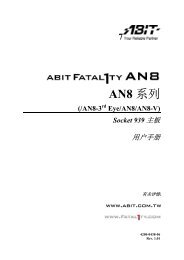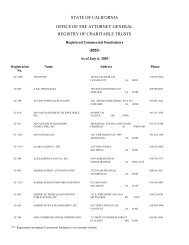Legal Rights of Persons With Disabilities - Ossh.com
Legal Rights of Persons With Disabilities - Ossh.com
Legal Rights of Persons With Disabilities - Ossh.com
Create successful ePaper yourself
Turn your PDF publications into a flip-book with our unique Google optimized e-Paper software.
c. Filing a Complaint and Holding a Mediation Conference<br />
Administrative review begins when a <strong>com</strong>plaint is filed with the Superintendent <strong>of</strong> Public<br />
Instruction. However, either party may request a voluntary mediation conference at any time. The<br />
mediation conference will be held within 15 days <strong>of</strong> the filing <strong>of</strong> a request for mediation with the<br />
superintendent. In a mediation conference, a disagreement is resolved only when both parties agree. If the<br />
parties cannot resolve all their disagreements, then the dispute must be resolved at an administrative<br />
hearing. (Ed. Code, '' 56500.3 and 56503.)<br />
d. Parents Have the Right to Inspect All Their Child's Records<br />
The parents <strong>of</strong> a child with a disability have the right to inspect and make copies <strong>of</strong> any and all<br />
records maintained by the school district concerning their child. The school district must make the records<br />
available for inspection and copying within five days <strong>of</strong> the parents' request to see them. The school district<br />
must also give the parents an opportunity to inspect and copy their child's records before a meeting <strong>of</strong> the<br />
IEP team, a mediation conference, or an administrative hearing. The school district may ask the parents to<br />
pay the costs <strong>of</strong> the copying <strong>of</strong> the records, but if the parents cannot afford the costs <strong>of</strong> copying, then the<br />
school district must give them free copies. (Ed. Code, ' 56504; 34 C.F.R. '' 300.502 and 300.566.)<br />
e. Administrative Hearing<br />
Any party may choose to present its evidence and argument through a lawyer. The Superintendent<br />
<strong>of</strong> Public Instruction must give the parents information on any free or low-cost representation available in<br />
the area whenever the parents request the information or file a <strong>com</strong>plaint. (Ed. Code, '' 56502 and 56507;<br />
20 U.S.C ' 1415(h); and McSomebodies v. Burlingame Elementary School Dist. (9th Cir. 1989) 897 F.2d<br />
974.)<br />
f. The Child's Placement Remains the Same During<br />
Administrative Review<br />
The filing <strong>of</strong> a <strong>com</strong>plaint preserves things as they are. If the dispute between the parents and the<br />
school district concerns the assessment or placement <strong>of</strong> the child, the assessment or placement cannot be<br />
carried out during the administrative review. If the dispute between the parents and the school district<br />
concerns the type <strong>of</strong> special education or related services needed by the child, the child's program must<br />
remain the same until the dispute is resolved. If the child was not in school at all, he or she must be<br />
allowed to enroll in a regular public school program during the administrative review. However, the<br />
parents and the school district can negotiate a temporary agreement about special education, related<br />
services, or placement. (20 U.S.C. ' 1415(j).)<br />
Parents have the final responsibility for the protection and education <strong>of</strong> their children. Although<br />
parents must send their children to school, parents need not leave their children in a school where they are<br />
denied the education they have a right to or the services they need. If the school district refuses to provide<br />
needed special education, needed related services, or an appropriate placement, then the parents can send<br />
their child to a school that does provide the appropriate education, services, or placement. The parents will<br />
be reimbursed for the cost <strong>of</strong> sending their child to the alternative school. However, if the hearing <strong>of</strong>ficer or<br />
the courts ultimately decide in favor <strong>of</strong> the school district, then the parents must pay for the school they<br />
choose. (Union School Dist. v. Smith (9th Cir. 1994) 15 F.3d 1519, cert. den. (1994) 115 S.Ct. 428.)<br />
2. Judicial Review<br />
49


